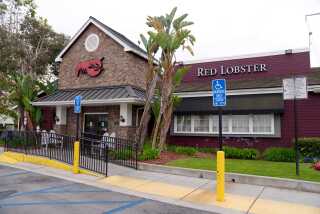Drug Stocks Pull the Dow Down 18 : Market Overview
* Blue chip stocks ended lower as drug issues suffered another major selloff. A few big industrial issues also fell sharply. The Dow Jones industrial average lost 18.92 points to 3,255.99.
* Long-term bond yields fell, but short-term rates rose. Oil prices slumped despite Mideast tensions.
Stocks
On the eve of President-elect Bill Clinton’s inauguration, a late round of selling pushed stocks down at the close--keeping the market in the sluggish pattern that has prevailed so far in 1993.
Still, advancing issues edged losers on both the New York Stock Exchange and the NASDAQ market. Big Board volume totaled 289.40 million shares against Monday’s 204.07 million.
As expected, IBM Corp. reported a record loss--$4.96 billion in 1992--and analysts foresee more red ink for the computer giant in the current quarter. IBM stock traded as high as 50 7/8, but closed down 1 1/8 to 48 3/8.
Industrial issues in general were in demand early in the day, but many of them sold off as trading wore on. What hurt the broad market indexes most, however, was another deep decline in drug stocks--which were among last year’s big losers. Investors fear that the Clinton Administration will hurt the industry’s profitability in the name of restraining health-care costs.
On the plus side, bank stocks surged on good earnings reports.
Among the market highlights:
* Drug issues falling sharply included Warner Lambert, off 3 to 63 5/8; Alza, down 2 1/8 to 43 1/8; Pfizer, which lost 2 1/4 to 61; Schering-Plough, off 1 1/2 to 56 3/8; and Merck, down 5/8 to 40 3/4.
American Home Products, a drug and consumer products maker, worsened the overall sentiment toward the group after it reported slightly lower fourth-quarter earnings. It blamed a higher tax rate. The stock slumped 3 to 63.
* Many other consumer stocks joined the drug stock selloff. Coca-Cola fell 1 1/8 to 42, Johnson & Johnson gave up 1 3/8 to 45 3/8, Philip Morris sank 1 to 70 5/8 and Kellogg dropped 1 5/8 to 61 3/8.
Also, Jack-in-the-Box restaurant owner Foodmaker plunged 1 1/2 to 12 1/8 on reports of food poisoning at some Washington restaurants.
* On the plus side, Wells Fargo led the charge in bank stocks, rocketing 13 to 99 after saying problem loans fell in the fourth quarter. Another big winner was First Interstate, leaping 2 1/8 to 52, also on a strong quarterly report.
Other bank winners included BankAmerica, up 3 7/8 to 53 3/8; Citicorp, up 7/8 to 24 1/2; Bank of Boston, up 1 1/4 to 26 7/8; NationsBank, up 3/4 to 52 7/8; First Chicago, up 1 to 40 1/2; and BancOne, up 3/4 to 52 1/2.
* Auto stocks salvaged their part of the early industrial stock rally. Chrysler rose 1 to 38 1/2, GM gained 1 1/8 to 36 5/8 and Ford Motor added 3/4 to 47 3/8.
Other industrial winners included Clark Equipment, up 1 1/8 to 22 1/4; Cummins Engine, up 7/8 to 83 1/4; Kennametal, up 1/2 to 29 1/2; and Georgia-Pacific, up 1/2 to 59 7/8.
In overseas markets, London’s Financial Times-100 average slumped 25.5 points to 2,737.6, while Frankfurt’s DAX index added 5.7 points to 1,578.83.
In Tokyo, the Nikkei index rose 181.40 points to 16,798.64.
Credit
Long-term bond yields dropped as rumors circulated once again that the incoming Clinton Administration may sharply reduce long-term bond borrowing.
The Treasury’s 30-year bond yield fell to 7.30% from Friday’s 7.35% (the bond market was closed for the holiday Monday).
Some of Clinton’s economic advisers are believed to favor a shifting of Treasury borrowing to shorter-term maturities. That would save the government interest expense because yields are lower at shorter terms.
But those same revived rumors may have caused a jump in short-term rates Tuesday on fears of greater supply. The yield on three-month T-bills rose to 3.09% from 3.02% Friday. Yields on 2-year to 7-year T-notes also edged up.
The fed funds rate, the rate on overnight loans between banks, was 3.25% versus 2% Friday.
Other Markets
The dollar eased against most currencies, which traders attributed to an adverse tax proposal in Germany and some skepticism about the new Administration’s ability to stoke economic growth.
Currency traders said the dollar weakened early on an announcement from Germany’s finance ministry that it has proposed a 30% tax on income German investors receive on foreign mutual funds.
The dollar finished at 125.50 Japanese yen in New York, down from 125.55 Monday. It also fell to 1.611 German marks from 1.615.
Elsewhere, oil prices weakened amid perceptions of lessening tension between Iraq and the United States. Light, sweet crude oil for February closed down 29 cents a barrel to $18.58 on the New York Mercantile Exchange.
On New York’s Comex, near-term gold rose 60 cents to $328.60 an ounce. Silver rose 1 cent to $3.69.
Dow Jones Industrials
New York Volume, Los Angeles Times
Markets at a Glance






